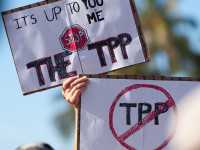KEI this morning released the May 2015 draft of the copyright provisions in the Trans Pacific Partnership (copyright, ISP annex, enforcement). The leak appears to be the same version that was covered by the EFF and other media outlets earlier this summer. As such, the concerns remain the same: anti-circumvention rules that extend beyond the WIPO Internet treaties, additional criminal rules, the extension of copyright term, increased border measures, mandatory statutory damages, and expanding ISP liability rules, including the prospect of website blocking for Canada.
Beyond the substantive concerns highlighted below, there are two key takeaways. First, the amount of disagreement within the chapter is striking. As of just a few months ago, there were still many critical unresolved issues with widespread opposition to (predominantly) U.S. proposals. Government ministers may continue to claim that the TPP is nearly done, but the parties still have not resolved longstanding copyright issues.
Second, from a Canadian perspective, the TPP could require a significant overhaul of current Canadian law. If Canada caves on copyright, changes would include extending the term of copyright, implementing new criminal provisions, creating new restrictions on Internet retransmission, and adding the prospect of website blocking for Internet providers. There is also the possibility of further border measures requirements just months after Bill C-8 (the anti-counterfeiting bill) received royal assent.







